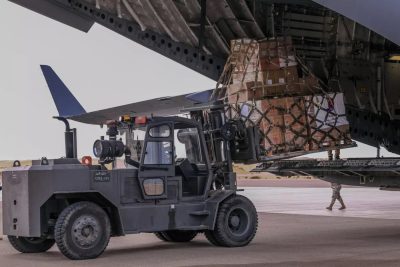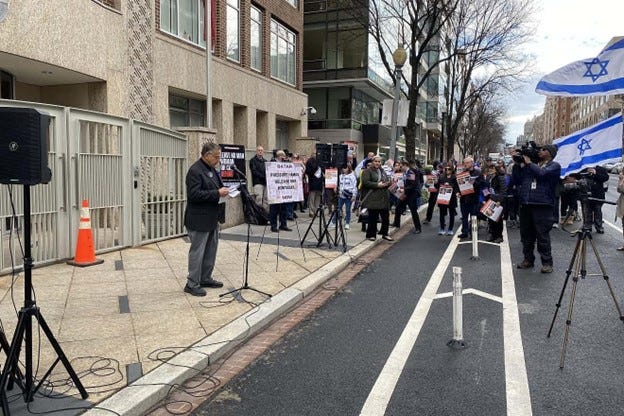Qatar’s Gaza War Mediation May be a “Double-edged Sword:”

All Global Research articles can be read in 51 languages by activating the Translate Website button below the author’s name (only available in desktop version).
To receive Global Research’s Daily Newsletter (selected articles), click here.
Click the share button above to email/forward this article to your friends and colleagues. Follow us on Instagram and Twitter and subscribe to our Telegram Channel. Feel free to repost and share widely Global Research articles.
Donation Drive: Global Research Is Committed to the “Unspoken Truth”
***
Qatari mediation in the Gaza war threatens to become a double-edged sword.
Demonstrators gathered this week at Qatari diplomatic missions in Washington, New York, and Ottawa to express frustration with the Gulf state’s failure to achieve an Israeli-Hamas agreement on a second round of prisoner exchanges.
Ron Halber, executive director of the Jewish Community Relations Council of Greater Washington, told the Washington gathering that the demonstrations were meant “to thank the Qataris and at the same time to press them to push Hamas. Those two things are not in conflict: You’ve done a good job, you really need to do more of a good job.”
Earlier, Israeli protesters rallied at Qatar’s Washington embassy, striking a far more strident tone. Their message was “Qatar is Hamas.”
The Israeli nationals held the Gulf state responsible for Hamas’ October 7 attack on Israel in which more than 1,100 people, mostly civilians, were killed and some 240 were taken hostage.
“We are here today to call out Qatar for what it really is: a terror supporting state seeking to destabilize the Middle East region. We will not allow Qatar to wash its hands (of) its responsibility (for) what happened on October 7,” said Nimrode Pantz, a lawyer and protest organiser.

Norman Goldstein, uncle of Hersh Goldberg-Polin, whom Hamas is holding hostage in Gaza, addresses about 50 people in front of the Qatari embassy in Washington, D.C. on Feb. 2, 2024. Photo: Andrew Bernard
Another speaker vowed that the protesters would “hunt (Qatari diplomats) in every place you will be until we see (the hostages) back.”
In November, Qatar negotiated a week-long truce during which Hamas exchanged more than 100 hostages, kidnapped during the October 7 attack.
Hamas still holds 136 hostages and bodies of captives killed in the fighting in Gaza.
Qatari Prime Minister Mohammed Abdulrahman al-Thani, together with the intelligence chiefs of the United States, Israel, and Egypt have drafted a plan based on proposals by Hamas and Israel, involving a pro-longed ceasefire and swap of all hostages and bodies for an unspecified number of Palestinians in Israeli prisons.
The main obstacle to an agreement is that Hamas insists on a permanent ceasefire that would end the war while Israel maintains that ending the war is non-negotiable.
The parties also have yet to agree on the staggered ratio of Palestinians to be released for each Hamas-held hostage and the identity of the Palestinians to be freed.
Considering Hamas’ main bargaining chip is its hostages, the group might insist on keeping a few hostages to make sure Israel abides by an agreement – a demand Israel is certain to reject.
Alternatively, a Hamas official suggested that the group may seek guarantees from the United States, Qatar, and Egypt that the ceasefire amounts to an end to the war.
“Our aim is to finish this as soon as possible…to bring the hostages back, but to put a closure for the war as well,” Mr. Al-Thani told National Public Radio.
It’s going to take fancy language to bridge the gap.
The trick will be a formula that allows both parties to claim they have achieved their irreconcilable goals.
One formula may be a lengthy ceasefire, potentially described as transitional rather than permanent. This would allow Israel to maintain that the war will continue while Hamas could claim the contrary.
Israeli Prime Minister Binyamin Netanyahu has not made things easier by adopting a hardline in recent days. He has not only rejected ending the war, but also the release of “thousands of terrorists” and the withdrawal of Israeli troops from Gaza any time soon.
Mr. Netanyahu may sing a different tone this weekend in talks with US Secretary of State Antony J. Blinken, on his sixth visit to Israel since the war began, but any hostage swap agreement will likely entail provisions that could prompt his far-right coalition partners to withdraw from the government.
Mr. Netanyahu may hope that Hamas will rescue him by rejecting anything less than an end to the war and the release of thousands of Palestinians in Israeli prison in exchange for the hostages.
The State Department and British Foreign Secretary David Cameron, in an apparent attempt to pressure Mr. Netanyahu to soften his rejection of the creation of an independent Palestinian state and approach to the hostage negotiations, are exploring possibilities of recognising Palestine as a state.
So far, the US and Britain have recognised President Mahmoud Abbas’ West Bank-based Palestine Authority as the entity governing the West Bank and official Palestinian interlocutor under the 1993 Oslo accords between Israel and the Palestine Liberation Organisation (PLO).
This week’s US sanctioning of four vigilante Israeli West Bank settlers sent a similar message.
Even though small in number, the demonstrations in the US and Canada echo Mr. Netanyahu’s recent criticism of Qatar.
“You don’t hear me thanking Qatar… It is essentially no different from the UN or Red Cross, and in a certain sense is even more problematic – I have no illusions about them… They have leverage over (Hamas). Why do they have leverage? Because they finance them,” Mr. Netanyahu told hostage families earlier this month, ignoring that Qatari funding of Hamas in Gaza was at his behest.
“Qatar hosts the heads of Hamas; it also funds Hamas; it has leverage on Hamas…They placed themselves as mediators – so start proving it and bring back our hostages,” Mr. Netanyahu said in a subsequent news conference.
This week, the Middle East Media Research Institute (MEMRI), founded by Yigal Carmon, a former advisor to Israel’s West Bank and Gaza occupation authority and Prime Ministers Yitzhak Shamir and Yitzhak Rabin, sought to bolster Mr. Netanyahu’s argument. MEMRI reported that Qatar regularly trained Hamas’ police force.
In response, Qatar’s Foreign Ministry accused Mr. Netanyahu of “undermining the mediation process for reasons that appear to serve his political career instead of prioritizing saving the lives of innocents, including Israeli hostages.”
Echoing Mr. Netanyahu’s criticism and American Jewish leaders’ frustration, Democrats and Republicans in the US Congress have asked the Biden administration to pressure Qatar. The lawmakers also called for Hamas’ expulsion from Qatar.
The United States agreed with Qatar in October to revisit the Gulf state’s relationship with Hamas once all hostages have been released.
Officials of both countries left open whether the review would lead to the expulsion of Hamas representatives or to restrictions on their ability to operate from the Gulf state.
What the review will entail is likely to depend on whether and in what state Hamas survives the Gaza war. A Hamas survival could mean that the United States, and for that matter Israel, will have a continued need for a backchannel.
Nevertheless, the criticism threatens to put a dent in Qatari relations with the American Jewish community, a pillar of its largely successful soft power strategy in the United States.
Hamas has maintained a presence in Qatar since 2012 at the request of the United States and with Israel’s acquiescence.
Qatar and the administration have pushed back at the criticism.
“I’ve been hearing this a lot about the leverage and the pressure. Qatar needs to be understood clearly in this context. Our role as a mediator is to try to bring the parties to bridge the gaps between them,” Mr. Al Thani said in an on-stage interview at the Atlantic Council, a Washington thinktank.
“Beyond this leverage, we don’t see that Qatar is a superpower that can impose something on this party or another party to bring them to that place. Basically, were using our good offices to connect, to bridge gaps, to put solutions and come up with some alternatives,” he added.
Roger Carstens, US President Joe Biden’s top hostage envoy, told the Hostages’ Families Forum and the American Jewish Committee that Qatar is “doing everything we’re asking.”
Members of the Forum met last week with Mr. Al-Thani to thank him for his efforts.
Even so, Emily Moatti, a member of the Forum’s diplomatic team and a former Israeli parliament member, suggested the families were holding their nose while working with Qatar.
The Forum “thinks that the only way hostages will be released is through negotiations, and as unfortunate as it may be – we would prefer Egypt – Qatar is totally a partner in this,” Ms. Moatti said.
In a twist of irony, a Qatar-funded consultant, Jay Footlik, helped the families get meetings with Mr. Al-Thani and other Qatari officials and coached them on how to approach those encounters. Qatar pays Mr. Footlik’s, consultancy, ThirdCircle Inc., US$40,000 a month.
*
Note to readers: Please click the share button above. Follow us on Instagram and Twitter and subscribe to our Telegram Channel. Feel free to repost and share widely Global Research articles.
Dr. James M. Dorsey is an Adjunct Senior Fellow at Nanyang Technological University’s S. Rajaratnam School of International Studies, and the author of the syndicated column and podcast, The Turbulent World with James M. Dorsey.
Featured image: Airport workers unload crates with aid delivered from Qatar destined for Gaza at El Arish International Airport (Qatar Ministry of Foreign Affairs)

